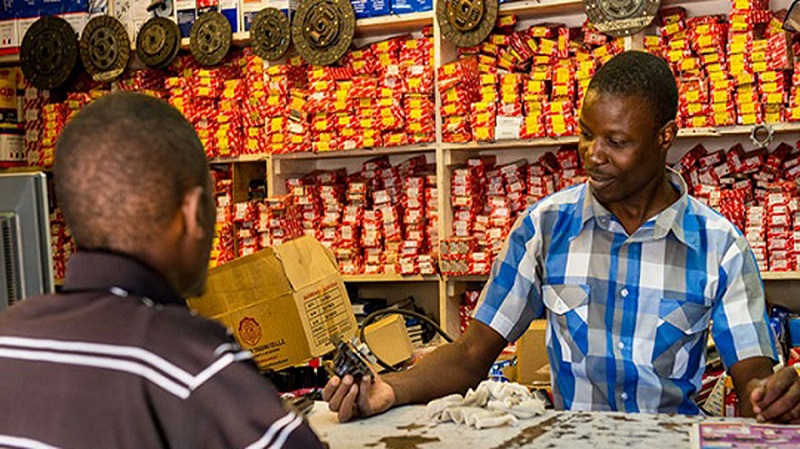38% of Nigeria’s SMEs make less than ₦10,000 ($6.78) in daily profit, according to Moniepoint’s 2025 Informal Economy Report, suggesting that small businesses—critical engine of the country’s economy—remain stuck in survival mode rather than scaling toward growth.
The study, which leveraged Moniepoint’s data of 5 million businesses and physically surveyed small business owners across the country, found that most informal businesses generate daily revenues between ₦20,000 ($13.56) and ₦50,000 ($33.89). 38% earn profits below ₦10,000 ($6.78) daily, while 70% make less than ₦50,000($33.89).
Median profit ranges from ₦10,000 ($6.78) to ₦20,000 ($13.56).
Micro, Small, and Medium-sized Enterprises (MSMEs) form the backbone of Nigeria’s economy, contributing around 65% of GDP and providing more than 80% of all jobs. But rising operational costs continue to make them unprofitable.
Survival check: How resilient is your business?
The central question of survival is your savings buffer and cost pressure. Answer these questions to see how your resilience compares to others in the informal economy.
National Context: 42% of businesses can only survive for 1 month or less.
Source: Moniepoint Informal Economy Report 2025.
Moniepoint’s report revealed that 44% of businesses in the informal economy earn below ₦20,000 ($13.56) daily.
Women-owned Nigerian SMEs fare worse. 41% of women entrepreneurs earn below ₦10,000 ($6.78) daily, compared to 34% of men. On the other hand, 16% of men-owned businesses earn above ₦50,000 ($33.89) compared to 10% of women-owned businesses.
Rising costs for informal businesses
While 65% of informal businesses reported revenue growth over the past year, only 47% saw an increase in profit. Nearly eight in ten (79%) said their cost of doing business had gone up, driven by higher supplier prices, transport costs, and a weaker naira.
The profit squeeze: Why rising revenue doesn’t mean more money
**Insight:** The gap between the metrics reveals the system shock. The cost of doing business has become the primary barrier preventing revenue gains from converting into tangible profit for nearly half the sector.
Source: Moniepoint Informal Economy Report 2025 (Pages 12, 23, 24).
The naira lost about 70% of its value in 2024 after the Central Bank of Nigeria relaxed longstanding foreign exchange restrictions. This ballooned cost in an import-dependent economy, with inflation soaring to a 28-year high in November 2024.
“The value of the Naira against foreign currencies depreciated from 460 NGN/USD to around 1600NGN/USD from June 2023 – June 2025,” said Nurudeen Abubakar Zauro, Secretary/Head, PreCEFI Secretariat, Technical Advisor to the President on Economic and Financial Inclusion, Office of the Vice President
“This forced price hikes on imported commodities, reduced purchasing power, increased costs and bottlenecks in supply chain networks, logistics and transport, thereby causing many SMEs to become bankrupt and diminishing the contribution of the informal economy to the country’s Gross Domestic Product (GDP),” said Nurudeen Zauro, secretary/head, PreCEFI Secretariat, Technical Advisor to the President on Economic and Financial Inclusion, Office of the Vice President.
Higher operating costs are biting into informal businesses’ pockets, with only 74% of them saving money, compared to 92.4% in the previous year.
Cooperatives and digital banks remain their preferred saving channels, with most savings directed toward business expansion (41%) or goods purchases (24%), as borrowing appetite grows due to higher interest rates and more stringent lending conditions.
“Given the aversion to borrowing that has risen in the past year, savings are the primary means by which these businesses access the funding they need to expand their operations or cater to emergencies,” Moniepoint said.
Policy rethink needed
Government policies must shift from fragmented interventions to coordinated, systemic measures to unlock growth and inclusion for informal business, according to Foyinsolami Akinjayeju, CEO, Enhancing Financial Inclusion & Advancement.
“If informal businesses are to evolve into growth-oriented employers, policies must deliberately target their transition from survivalist enterprises to scalable ventures,” added Chinyere Almona, DG, Lagos Chamber of Commerce and Industry.
“A foundational step is the provision of structured capacity-building programs, embedded within local chambers of commerce and trade associations, to upskill operators in bookkeeping, inventory management, and digital tools.”








